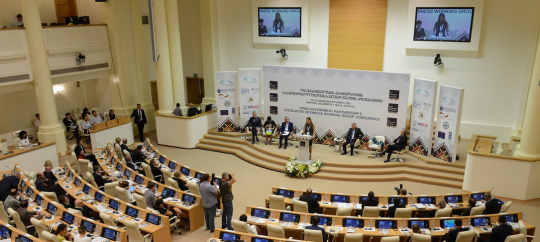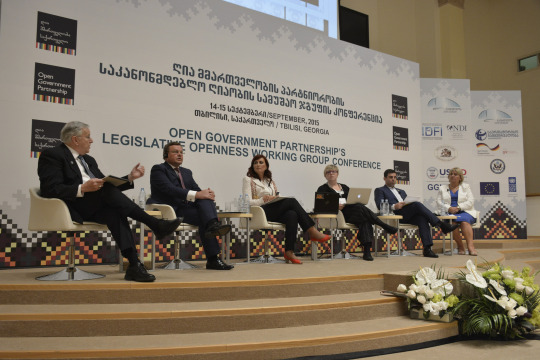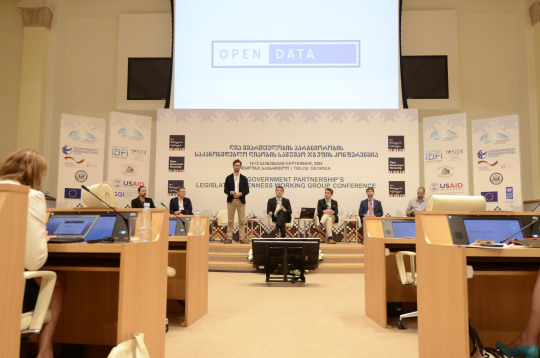
On September 14-15, the Parliament of Georgia hosted a global meeting of the Open Government Partnership’s Legislative Openness Working Group, a gathering that brought together over 75 parliamentary and civil society delegates from more than 30 countries. The conference, entitled Committing to Openness: Parliamentary Action Plans, Standards, and Tools, explored actionable strategies for advancing transparency and citizen participation in the legislative process. Along with the Parliament and the Working Group, which is co-chaired by the Congress of Chile and the National Democratic Institute, the event was supported by UNDP, USAID, GIZ, Transparency International Georgia, Institute for Development of Freedom of Information, KohoVolit, and many others. All conference sessions can be viewed here and photos from the conference can be seen here.
During her remarks, South African Deputy Minister Ayanda Dlodlo, Co-Chair of the OGP Steering Committee stated that “the act of opening up the legislature is essential for any democracy and is crucial for its proper functioning.” Legislative openness is a critical component of effective representative democracy. Meaningful public engagement and participation in the legislative process can only exist when the public understands the legislative process and has access to the necessary information. Beyond its own openness, parliaments also play a key role in advancing openness throughout the government via legislation, oversight, and representation.
The conference in Tbilisi indicated that there is growing interest from both parliaments and civil society groups in advancing legislative openness and developing new approaches for achieving openness in our tech-empowered world. The conference provided participants with comparative examples and successful strategies for increasing parliamentary openness.

Members of parliament from Lithuania, Serbia, Croatia, Ukraine, and Georgia share updates on their legislative openness work. Moderated by Former US Congressman Les AuCoin, video of the session can be seen here
One approach to openness reform that was discussed extensively is the development of legislative openness action plans. While many parliaments have participated in the Open Government Partnership process by including legislative openness commitments in the government’s National Action Plan, a growing number of legislatures have developed independent openness action plans. These plans, which have been developed in Georgia, Chile, and France, are typically drafted in close consultation with civil society and often draw inspiration and guidance from international standards, such as the Declaration on Parliamentary Openness. This approach continues to gain traction, and several conference participants indicated interested in using this approach to drive openness reform in their home legislature. (There will be a sessions at the OGP Global Summit that further explores this topic, organized by the Working Group and UNDP. View it here.)
The importance of technology was also discussed during several conference sessions. In his opening remarks, Speaker Usupashvili stated that “in the 21st century, it is necessary to have innovative approaches to the fundamental principles of democracy.” While legislative openness does not require technological innovation, it is increasingly true that citizens expect to access parliamentary information and engage with their elected representatives online. To meet these expectations, and to modernize the institution for an increasingly wired world, parliaments stand to benefit from the development of new technologies. That being said, parliaments can be slow to modernize and often struggle with limited tech skill and capacity. Civil society groups, on the other hand, are often tech-savvy and can support legislatures by demonstrating what can be achieved.

Civil society representatives kicked off the second day of the conference by presenting legislative openness technology tools, and discussing concepts like open data. Video of the session can be seen here.
Whether discussing technology, action plans, or other approaches to openness reform, a primary theme of the conference was the importance of collaboration between parliament and civil society. As countless speakers and conference participants noted, collaboration can produce stronger action plans, better technology, and more effective reforms. In discussing the parliament’s website, Liia Hanni, a former member of the Estonian Parliament who is currently with the e-Governance Academy, stated that “ICT tools should be prepared cooperatively with the future users of these tools.” This sentiment extends beyond technology, of course: any reform initiatives or projects that are designed to increase openness should be carried out collaboratively with civic groups and members of the public, who are primary “users” of legislative information.
Congratulations to the Parliament of Georgia and all other organizing partners for such a fantastic event. We look forward to continuing the conversations started in Tbilisi at the upcoming OGP Global Summit and beyond.
Interested in participating? The Working Group is currently planning the legislative openness track at the OGP Global Summit in Mexico City on October 27-29. For more information on this event, see this blog post.